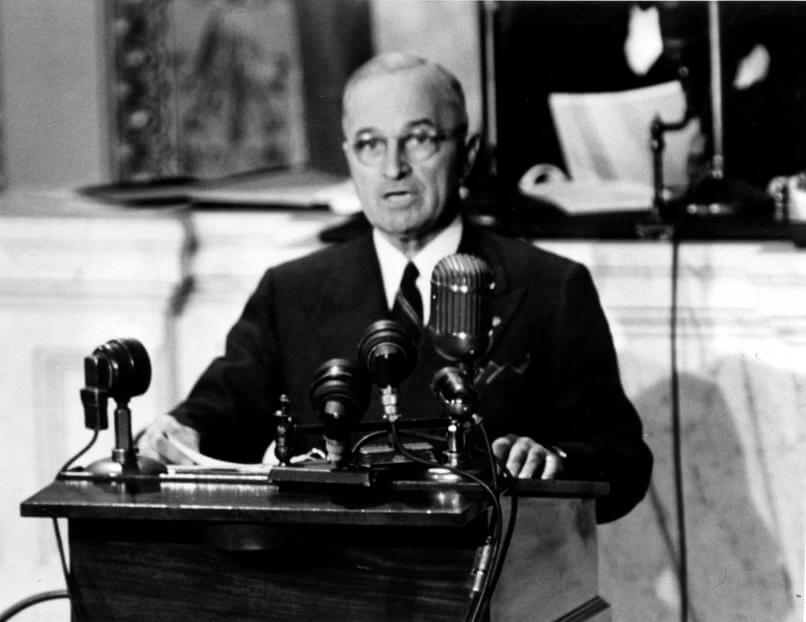Truman Doctrine

In 1946, Communist guerrillas had begun a civil war against the government of Greece. The Communist government of Yugoslavia gave substantial support to the guerrillas, while the British had provided the Greek government with aid. Eventually, the British informed the United States that Britain could no longer help support the regime in Greece.
The Greeks officially requested American aid and on March 12th, President Truman went before Congress and requested support for Greece as well as for Turkey. A total of $400 million was requested. Truman stated: "I believe that it must be the policy of the United States to support free people who are resisting attempted subjugation by armed minorities or outside pressure."
The Senate approved his request, 67 to 23, and the House approved it, 287 to 107.
The communists in Greece had resumed their civil war. At the end of December and into the new year, the situation continued to deteriorate. The US envoys in Greece were sending reports of the successes of then guerrillas who they reported were getting outside aid and the continued difficulties of the government in coping. The fear was growing within the US State Department that the Greek government might collapse. A memo was presented to Secretary of State Marshall named "Crisis and Imminent Possibility of Collapse." After reading it on February 21, 1947, he requested that Under Secretary Dean Acheson prepare a plan to implement such aid.
The next day the final dye was cast. The British sent an official message from the government, on the one hand, outlining Greece's need for foreign currency and other assistance, but then saying that because of Great Britain's economic crisis, the British could no longer aid either Greece or Turkey, whose situation while not as bad as Greece was also precarious especially as the Soviets were pressing the Turks to make concession regarding the passage through the Bosporus Straits. The document urged the US to take up the burden.
Together with the Army and Navy, the state department began to draw up plans on what the US could do. Over the next two days, operational procedures were developed. Finally, on February 24, Secretary of State Marshall met with President Truman and presented the British note. That note also included the notification that the British would withdraw their troops from Greece by the end of March.30, 1947.
Truman was meanwhile getting reports from Greece that only quick aid could save Greece from Communist domination. He requested an action plan, and on February 26, General Marshall, together with Under SecretaryDean Acheson, presented their recommendations together with those of General Eisenhower. It called for the immediate allocation of aid and military support for the government of both Turkey and Greece. Truman requested that Acheson and Marshall return to meet with Truman with the Congressional leadership the next day. After the situation was presented to the leadership of the Republican-controlled Congress, the leaders all voiced support for the plan.
At one o'clock on March 12, 1947, President Truman addressed a joint session of Congress in which he outlined what became known as the Truman Doctrine. He called for $250 million in immediate aid for Greece and $150 million for Turkey in the address. He stated in his speech, "I believe that it must be the policy of the United States to support free people who are resisting attempted subjugation by armed minorities or by outside pressure." Truman ended his speech by saying, "If we falter in our leadership, we may endanger the peace of the world - and we shall surely endanger the welfare of our own nation. When Truman completed his address, all but one Congressman stood and applauded. The Congress swiftly allocated the funds the military began providing assistance. A line had been drawn, and neither Turkey nor Greece succumbed to Soviet interference.
 >
>